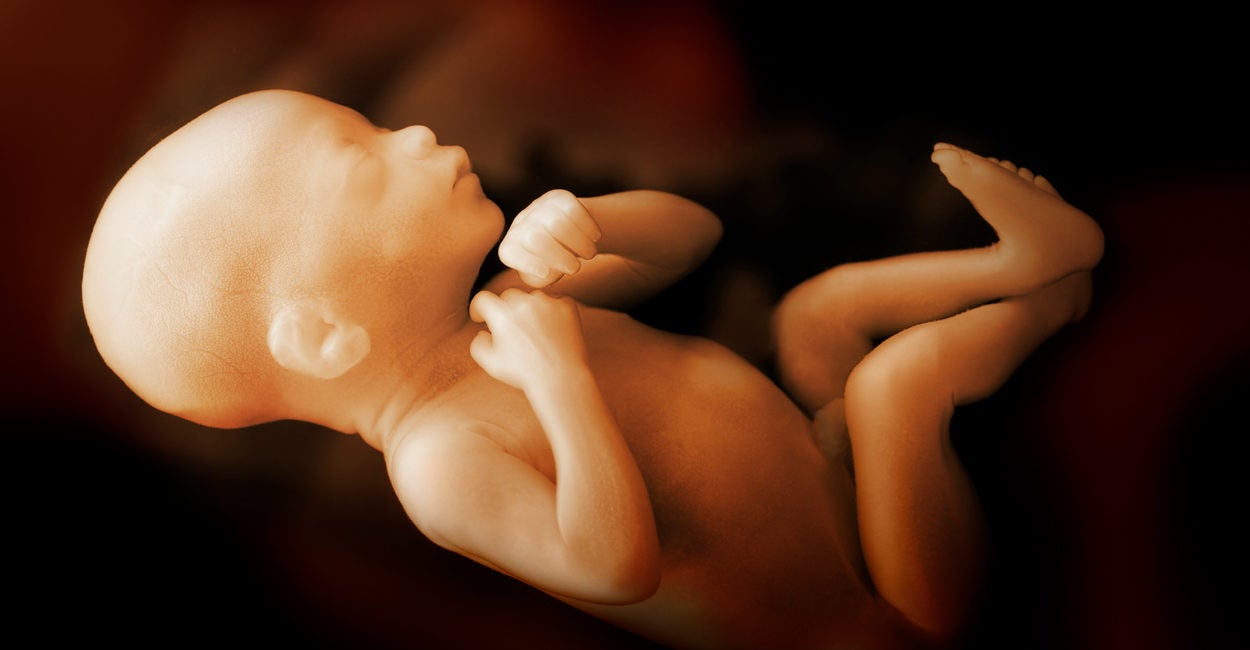The Moral Rot of the Left’s Abortion Agenda
The Moral Rot of the Left’s Abortion Agenda
Thomas Jipping / February 06, 2019 / This article is republished with permission from our friends at The Daily Signal

A human baby growing inside the womb at about 7 months. (Photo: ninjaMonkeyStudio/Getty Images)
Commentary By

Thomas Jipping is deputy director of the Edwin Meese III Center for Legal and Judicial Studies and senior legal fellow at The Heritage Foundation.
In a November 1789 letter to French scientist Jean-Baptiste Leroy, Benjamin Franklin expressed hope that the new U.S. Constitution would endure, but acknowledged that “nothing is certain except death and taxes.”
The taxes part isn’t really true today. More than 40 percent of Americans pay no federal income tax, and one-third of them also pay no payroll taxes. While the death part is obviously true eventually, some lawmakers are trying to make death more likely before birth.
Unlike firearms, abortion exists for the sole intended purpose of killing human beings. Except for Satan, Sauron, and the occasional psychopath, however, killing human beings really isn’t an aspiration. War, justice, or self-defense may require it, but the killing itself has never been seen as a good thing.
In its 1973 Roe v. Wade decision, the Supreme Court said that the Constitution protects a woman’s decision “whether or not to terminate her pregnancy.” The casual reference to the Constitution notwithstanding, the very next sentence revealed the court’s real motivation: the “detriment” that prohibiting abortion would “impose on the pregnant woman.”
Nonetheless, the fact remains that abortion kills human beings. Even Hillary Clinton, when she ran for president in 2008, said that while abortion should be safe and legal, it should be “rare, and by rare, I mean rare.”
Public opinion continues to echo that negative view toward the act of abortion itself. In one poll last year, younger respondents said by a margin of 47 to 39 percent that abortion is more likely to do harm than good to a woman’s life. A Gallup analysis found that “support for making abortion broadly illegal [is] growing fastest among young adults.”
This shift comes at a time when fewer abortions are being performed. The number of abortions in the U.S. has declined by nearly 50 percent in the last three decades.
Some lawmakers are determined to combat these encouraging signs. But since abortion kills human beings, the only way to feasibly argue for more abortion access is to deprive human beings of any significance at all before birth.
In New York, for example, the new law making abortion available until birth is just the beginning. That same law repeals the requirement to help babies that survive an abortion.
But New York legislators also went beyond abortion altogether, amending the state’s homicide statute so that it only applies after birth. Today, in “progressive” New York state, you can kill a human being before birth by abortion or any other method, intentionally or accidentally, whether the mother wanted the baby or not, and pay no legal price for it.
In Virginia last week, Del. Kathy Tran introduced House Bill 2491 to weaken even the few existing protections for babies during their final three months in the womb.
Under current law, two physicians must agree with the abortionist that a late-term abortion is necessary. Tran’s bill would let the abortionist alone decide.
Today, a late-term abortion is legal if the pregnancy would “substantially and irremediably” impair the woman’s physical or mental health. Tran’s bill would delete those key words.
During a subcommittee hearing on her bill, Tran admitted that it would allow an abortion even if the pregnancy was full-term and the mother was actually in labor. Tran’s bill would greenlight an abortion, even when the baby could survive outside the womb, on nothing but the say-so of the abortionist.
Here’s how little human life before birth matters to such advocates. Tran also introduced—on the same day, no less—House Bill 2495 to prohibit spraying a pesticide “intended to suppress an infestation of the fall cankerworm” between March 1 and Aug. 1.
According to the experts at Virginia Tech, eggs laid by this “sporadic pest” hatch in April and May and the new larvae are “voracious eaters.” Tran’s bill would make it more likely that cankerworms—also known, sometimes affectionately, as inchworms—make it to birth.
Franklin was right that death is certain for us all, but today legislators are working to make sure that time comes sooner for some of the most vulnerable.
Utah Standard News depends on the support of readers like you.
Good Journalism requires time, expertise, passion and money. We know you appreciate the coverage here. Please help us to continue as an alternative news website by becoming a subscriber or making a donation. To learn more about our subscription options or make a donation, click here.
To Advertise on UtahStandardNews.com, please contact us at: ed@utahstandardnews.com.
Comments - One Response to “The Moral Rot of the Left’s Abortion Agenda”
Pings:
Leave a Reply
You must be logged in to post a comment.


Comments:
“The U.S. Supreme Court has consistently held for over 40 years that states may not ban abortion prior to viability. The court has also made clear that states are prohibited from drawing a line at a particular number of weeks or at any other factor to establish fetal viability.” Cardiac cells do not a live baby make, with no connected nervous system, brain or vital organs, cultures of cardiomyocytes will rhythmically expand and contract in a petri dish. Just because cardiomyocytes are active doesn’t mean that 1) there is a heart, 2) that there are any other formed human organs, or 3) that a woman should lose autonomy and agency regarding her own fully formed organs to the state. Embryos, blastocysts, and zygotes are NOT PEOPLE anymore than omelets are fluffy baby chickens. If women are required to support the life of a zygote, or embryo why isn’t there also a requirement to donate kidneys to support the lives of others? That is if “pro-life” as opposed to “forced birth” is to have any credible meaning.